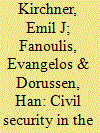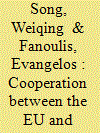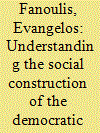|
|
|
Sort Order |
|
|
|
Items / Page
|
|
|
|
|
|
|
| Srl | Item |
| 1 |
ID:
158437


|
|
|
|
|
| Summary/Abstract |
The public image of the European Union (EU) has met increasingly negative evaluations since the economic and financial crisis hit its peak. Although opposition towards the EU has been pitched as a temporary phenomenon, it has now become a distinctive characteristic of European integration, described as ‘embedded’. Recent analyses on citizens’ attitudes towards the EU underline a rational utilitarian dimension, stressing that EU attachment is affected by future life expectations. Are rationalist perspectives the only possible explanation behind the rise of Euroscepticism, though? This article offers an alternative approach, by using discourse analysis, and examines how emotions, as embedded in Eurosceptic discursive frames and practices, may affect attitudes towards the EU. We argue that an analysis of citizens’ opposition through emotions when the salience of the EU increases can show how a Eurosceptic emotion-laden public discourse may become prominent at the domestic level.
|
|
|
|
|
|
|
|
|
|
|
|
|
|
|
|
| 2 |
ID:
137418


|
|
|
|
|
| Summary/Abstract |
Noting that European Union (EU) institutions are increasingly engaged in civil protection in the member states, security governance is used as an analytical framework to assess the depth of EU engagement in delivering civil security. It is shown that a state-centric approach is no longer adequate to understand the provision of civil security across Europe. To varying degrees, the EU has acquired responsibilities to facilitate, coordinate, manage, and regulate civil security, whether before or after a civil crisis occurs. The analysis demonstrates that, whilst intergovernmental practices and inter-state cooperation remain salient features of civil security, the responsibilities undertaken by the EU institutions across the entire policy spectrum are more substantial than a strictly intergovernmental perspective would suggest.
|
|
|
|
|
|
|
|
|
|
|
|
|
|
|
|
| 3 |
ID:
183715


|
|
|
|
|
| Summary/Abstract |
The European Union's partnership with China has received significant academic attention. Experts have focused on both parties’ economic and political objectives and have made efforts to grasp the dynamics of the institutionalisation of EU-China cooperation. However, little has been said about how this collaboration affects the lives of citizens, especially in China. Adopting a Foucauldian epistemology, this article's key contention is that EU-China cooperation imposes a joint form of post-liberal governmental power on the Chinese population, which socially constructs empowered but not liberal political subjectivities for Chinese citizens. The article first reviews Foucault's approach to governmentality. It then explores Sino-EUropean collaboration after 2013, when the two partners established the ‘EU-China 2020 Strategic Agenda for Cooperation’. We illustrate how the institutionalisation of the partnership has been consistent with a governmentalised political rationality, and how policy implementation has allowed a post-liberal form of governmental power to flow from both EU and Chinese policymakers towards the Chinese population, triggering processes of political subjectivisation.
|
|
|
|
|
|
|
|
|
|
|
|
|
|
|
|
| 4 |
ID:
134067


|
|
|
|
|
| Publication |
2014.
|
| Summary/Abstract |
Drawing upon the Foucauldian approach of governmentality, this article argues that the democratic deficit of the EU's Common Security and Defence Policy (CSDP) is the outcome of how governmental power flows in CSDP governance and more precisely within the governance practices of the policy. To support this argument, the narrative explores the secrecy/confidentiality, informality and normalisation of the exercise of governmental power in a concrete example of CSDP governance, the recent pooling and sharing initiative. The example shows that the official makers of CSDP pursue efficiency of governance to the detriment of the democratic quality of the policy, and this is related with the productive and expansive rationality of governmental power flowing in and between the EU institutions. Despite the fact that governmentality usually links to structural explanations, allowing limited space for the role of agency in politics, the article concludes with reflections on how the political agency of the governing EU political subjects contributes to the social construction of the democratic deficit of CSDP.
|
|
|
|
|
|
|
|
|
|
|
|
|
|
|
|
|
|
|
|
|